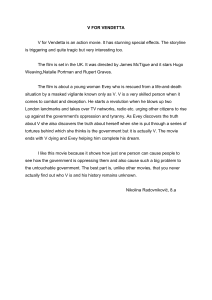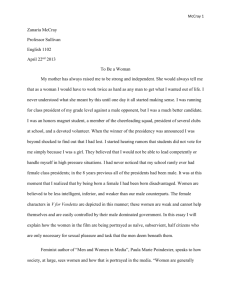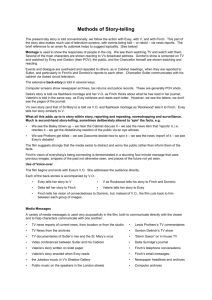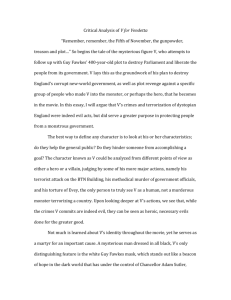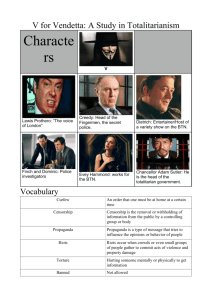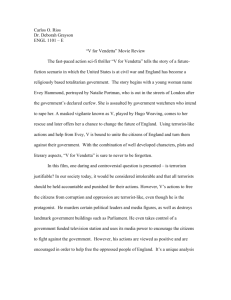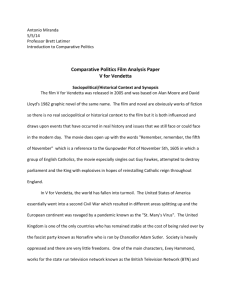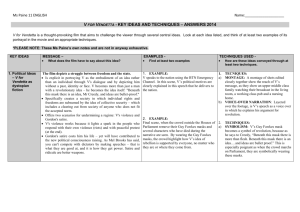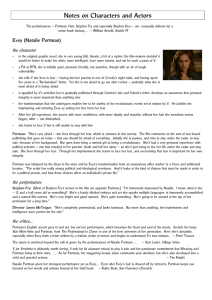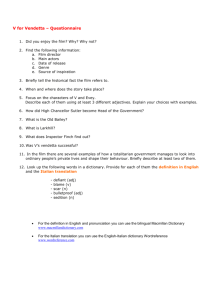Eric Burger
advertisement
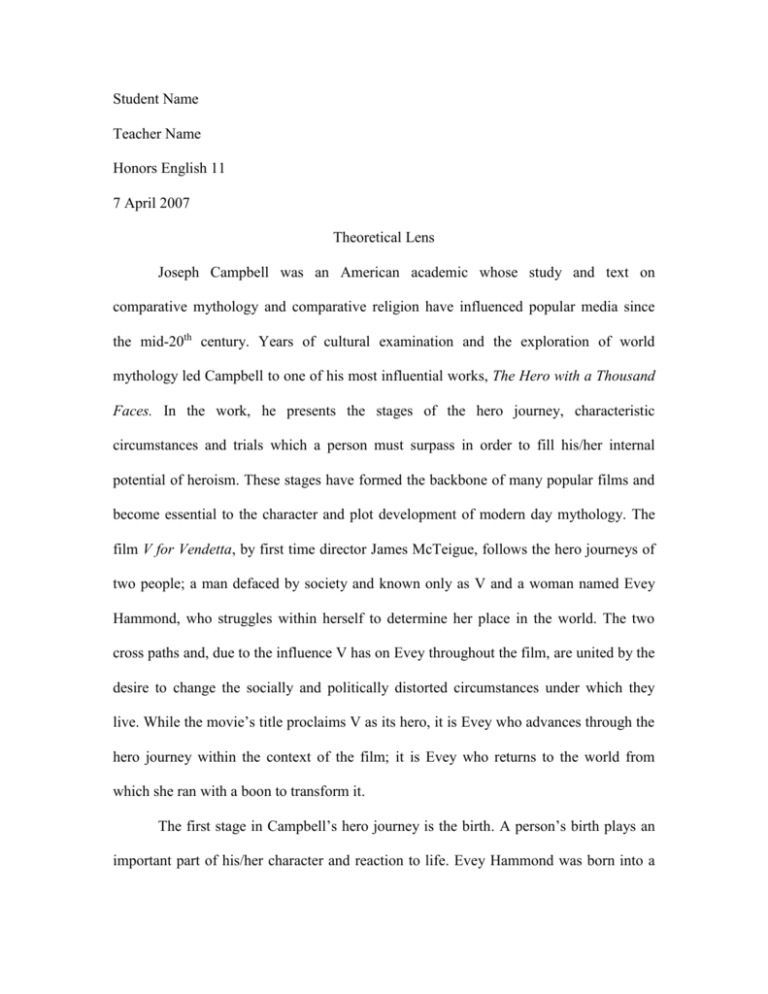
Student Name Teacher Name Honors English 11 7 April 2007 Theoretical Lens Joseph Campbell was an American academic whose study and text on comparative mythology and comparative religion have influenced popular media since the mid-20th century. Years of cultural examination and the exploration of world mythology led Campbell to one of his most influential works, The Hero with a Thousand Faces. In the work, he presents the stages of the hero journey, characteristic circumstances and trials which a person must surpass in order to fill his/her internal potential of heroism. These stages have formed the backbone of many popular films and become essential to the character and plot development of modern day mythology. The film V for Vendetta, by first time director James McTeigue, follows the hero journeys of two people; a man defaced by society and known only as V and a woman named Evey Hammond, who struggles within herself to determine her place in the world. The two cross paths and, due to the influence V has on Evey throughout the film, are united by the desire to change the socially and politically distorted circumstances under which they live. While the movie’s title proclaims V as its hero, it is Evey who advances through the hero journey within the context of the film; it is Evey who returns to the world from which she ran with a boon to transform it. The first stage in Campbell’s hero journey is the birth. A person’s birth plays an important part of his/her character and reaction to life. Evey Hammond was born into a Last Name 2 middle class family in near-future Britain. Her parents were political activists during the rise of a totalitarian regime known as Norsefire. The World is the environment which the hero has come to know and accept as unchanging. The World can appear to be the safest place when it is actually the barrier which prevents the hero from continuing on in his/her journey. In her parents’ lifetime, terrorism and plague had led to the near collapse of Britain. The ultra-conservative Norsefire party pledged to protect Britain against its enemies. In time, this pledge came to mean the removal of anyone that was different, religiously, culturally, or sexually, or politically. The country remained divided over this loss of freedom until a bioterrorist attack killed 80,000, including Evey’s brother, and left the population feeling vulnerable. The Norsefire party, led by Adam Sutler, again offered a safe and orderly world under his protection. This time the population welcomed Sutler’s promises and elected him as High Chancellor. Resulting legislation forces the population to act within the social boundaries as “different became dangerous.” Curfews, censorship, and surveillance gave the government freewill to meddle and direct the lives of citizens. Evey’s parents took part in riots after the landslide election of Adam Sutler. For this, they were arrested or “black bagged,” never to be seen again. Evey’s parents represented her Heroic ideal; a model which Evey envied. The destruction of her parents at the hands of the Norsefire party led Evey to fear and reject her Call to follow in the lifestyles of her parents. Evey grew up and chose a life within the boundaries of her environment while never forgetting her parents’ memory. One night, Evey is walking to the house of Gordon Dietrich, a superior at the British Television Network where Evey worker, for a date. She is out after curfew and is stopped by Fingermen, Norsefire secret police who answer only Last Name 3 to Party Leader Peter Creedy. These Fingermen, acting as guardians at the gate, attempt to rape Evey but are stopped by V. Supernatural Aid is essential to every hero’s journey. The hero is often content to continue to live within the life they have. It is then the Supernatural Aid which presents a different path and guides the hero along their journey whether he/she knows it or not. The Supernatural Aid is often the manifestation of what the hero truly hopes to become. V vanquishes the Fingermen and proceeds to introduced himself as both villain and victim of fate. V instantly decides that he is meant to find Evey and informs her that it is his mission in life to take vengeance against all who attempt to protect vice and promote injustice. Evey is overwhelmed by her protector but trusts him simply by the fact that he asks her to trust. The Call is the means by which the hero is asked to leave the safety of the world they exist in to find their true desire. The Call can have always existed within the hero, but is often presented or aroused by the Supernatural Aid. After V and Evey introduced themselves, V asks her to come with him to hear a concert. She accepts the call, unaware of the ultimate struggle and upheaval it will bring to her life. The two proceed to a nearby rooftop. The midnight bells toll the start of November 5. Soon, music begins to play over the citywide loudspeakers. As the music crescendo, explosions and fireworks begin going off in the Old Bailey building. The building is reduced to ruble before Evey’s eyes. This demolition is merely the first hint at what her Call entailed. Later that day, word of the destruction of the Old Bailey is out and the police are able to identify Evey as a witness to the scene. V, due to his mask, is safe from recognition. Evey is unavoidably linked to the demolition and the police begin searching Last Name 4 for her. The same day, V takes over the BTN station where Evey works. He broadcasts a message calling for revolution and destruction of Parliament in one year’s time. V forgives his listeners for their time of weakness and their willingness to give up on righteousness in fear of losing their lives. But now, they must destroy the intolerance and injustice that has infected the British government. V asks then to rise up against their government for it has gone too far. When the message ended, chaos in the news station follows. V is about to escape when he is stopped by an armed officer. Evey sneaks up behind the officer and sends pepper spray into his face. In the struggle she is knocked to the ground and passes out. By saving V, Evey accepts her call for the second time and must leave her life behind. V takes Evey to his home, The Shadow Gallery, knowing that if he had left her where she lay she would have ended up in the hands of the police, a far worse fate than isolation with V. This begins Evey’s Road of Trials. The Road of Trials begins when the hero has left the world behind. The hero must then face one obstacle after another; obstacles that are both mental and physical challenges. Evey expresses a desire to V that she be free from fear. She recognizes the need within herself to change, but accepts it as a condition of her personality. She unconsciously recognizes the Road of Trials in her future but feels too unprepared to take on the challenges. Upon being brought to the Shadow Gallery, Evey immediately rejects her call and demands the V let her go exclaiming “Why didn’t you just leave me along?” Evey fears the consequences of her actions and wished only to return to the World. She is unconcerned with the fact that V may have very well saved her life. V refuses to release her, knowing that the police would find her in a matter of time and force her to reveal Last Name 5 information about his hideaway. Evey, by the will of her Supernatural Aid, has no choice but to remain dead to the World. At this time, Evey learns that V intends to kill many prominent government officials and is willing to use her to do so. She is disgusted by V’s use of brutality, but slowly begins to understand his pursuit of vengeance. “Violence can be used for good,” he explains. In reaction to the intolerance and persecution of Norsefire party, V has brought it upon himself to pursue justice; his Boon to the World. To him, this also meant the judgment and destruction of those who committed crimes against himself and humanity yet remained unaccounted. Evey claims to want to aid V in his revenge, but when given the chance to lure a corrupt bishop and pedophile, she tries to reveal the trap to him. Again, Evey rejected her call and attempts to escape from her trials. The bishop doesn’t believe her until V burst through the door, but by then it is too late. Evey flees from the room as V attacks the bishop. Evey runs to the home of Gordon Dietrich, from BTN, and confides her situation in him. Gordon reveals to her that he too has much to hide. He admits to her that he was a closet homosexual and the owner of many censored and illegal artifacts including a Koran, but to live in the world he had to hide his true nature. The next night, Gordon is arrested for making fun of the High Chancellor on his show and executed after the police discovered the Koran in his house. Gordon tries to fulfill his own Hero Journey by resisting the censorships placed upon him, but he meets the same fate as Evey’s parents upon being captured by the World. Evey attempts to flee but is detained at the garden gate and forced into her Belly of the Whale. Last Name 6 The Belly of the Whale is often perceived by the hero as failure. The Belly is a period of inescapable suffering and emotional turmoil, but the only way to fail is to give in. The hero must endure to continue the journey, even if all hope seems to be extinguished. When Evey is captured, she is given the opportunity to give up the identity or whereabouts of V in exchange for her freedom. She refuses to do so. By refusing freedom, Evey knowingly accepts her call for the first time with the understanding that it would bring both mental and physical pain. Her captures shave her head, torture her for information and lock her in a concrete cell. In time, Evey refuses to fear death any longer. She is given her final opportunity to give information about V or be shot. Evey chooses to die. It is then that V, Evey’s Supernatural Aid, reveals that it was he who was her capture. He had forced Evey into her Belly, but it was her own strength and integrity that allowed her to endure and reach her Apotheosis. The Apotheosis is the hero’s ability to transcend the pain and the struggles he/she has experienced and to achieve an illumination of identity. The insights brought about by the Road of Trials and Belly of the Whale are finally realized. Through Evey’s time in captivity, she comes to recognize her own integrity and that its value outweighs even her own life. By overcoming the fear of death, Evey achieves the total freedom she desired. She could now return to the World without fear and with a completely new identity, but her journey isn’t over. Before V destroys Parliament, he first wishes to kill High Chancellor Sutler and Norsefire Party Leader Peter Creedy. V succeeds but is mortally injured in the conflict. Recognizing that he has played his part, V leaves the final decision of whether or not to Last Name 7 set off the bomb-filled subway train up to Evey. V has fulfilled his vengeance, but Evey has shown him that the destruction of the British government is not for him to decide. The Boon is what the hero is able to give back to the Universe. While it often takes the form of treasure, fame, or glory, the Boon is characterized by the gifts and knowledge a hero is able to bring back from his/her hero journey and give to the world. Evey is given the choice of whether or not to finish what V had begun years before. With the old regime destroyed, the new path that society chooses to follow is left to the decision of the next generation, Evey’s generation. Evey ultimately chooses to continue, not complete, the social transition taking place. She pulls the lever, starting the subway train, and watches from a nearby rooftop as Parliament is destroyed by a cascade of explosions and fireworks. Evey’s Boon to Britain is the opportunity to build a new government and social order.
